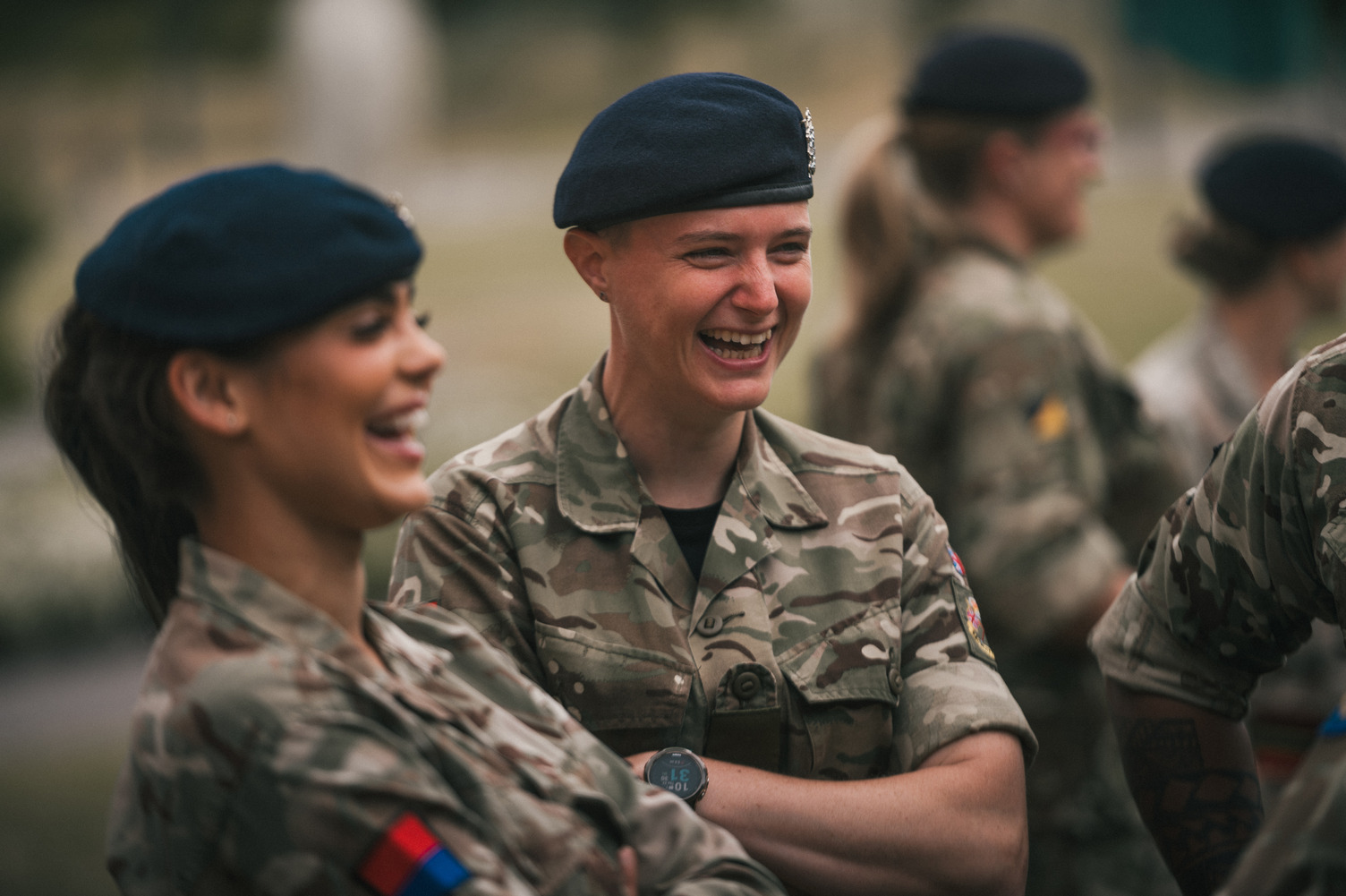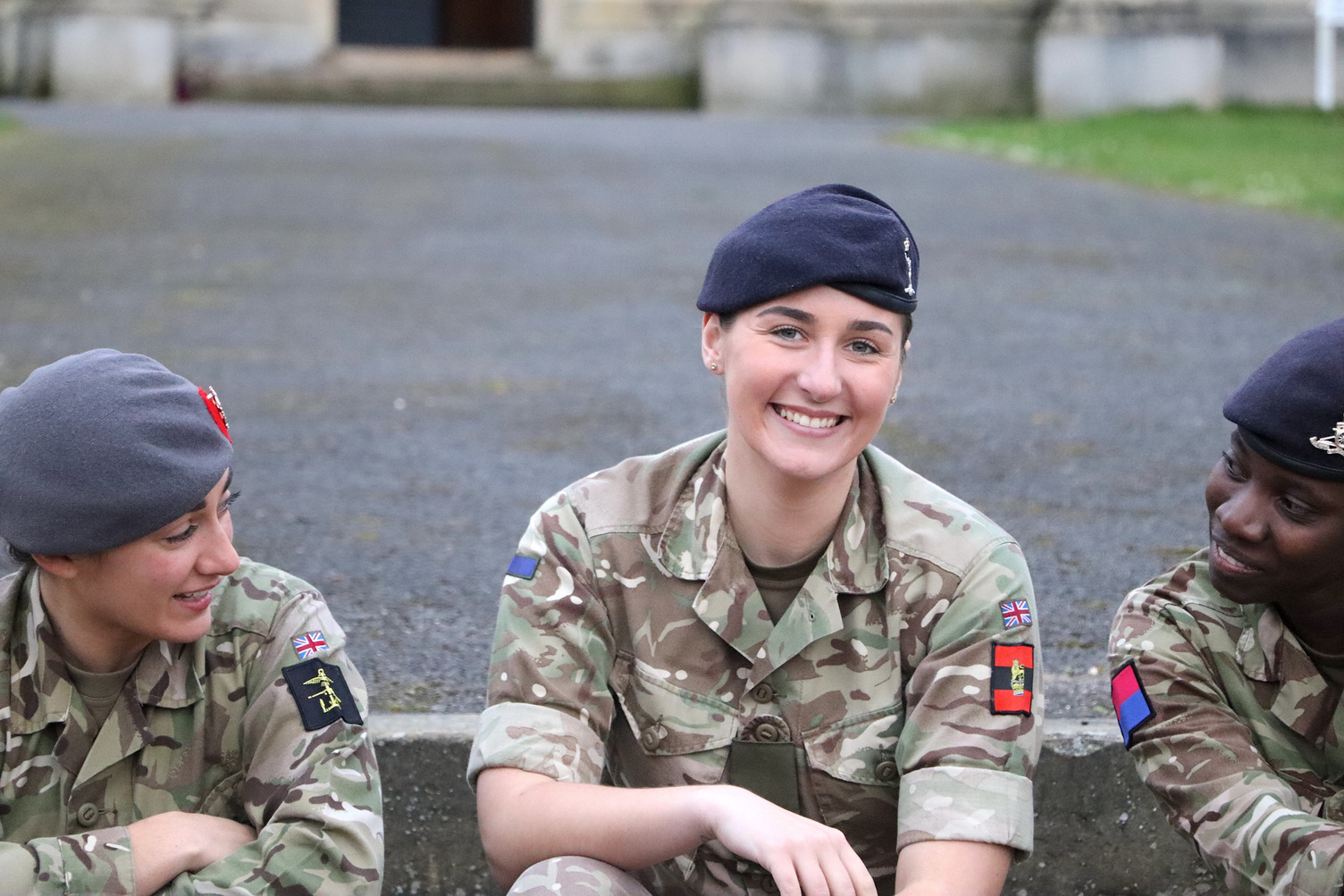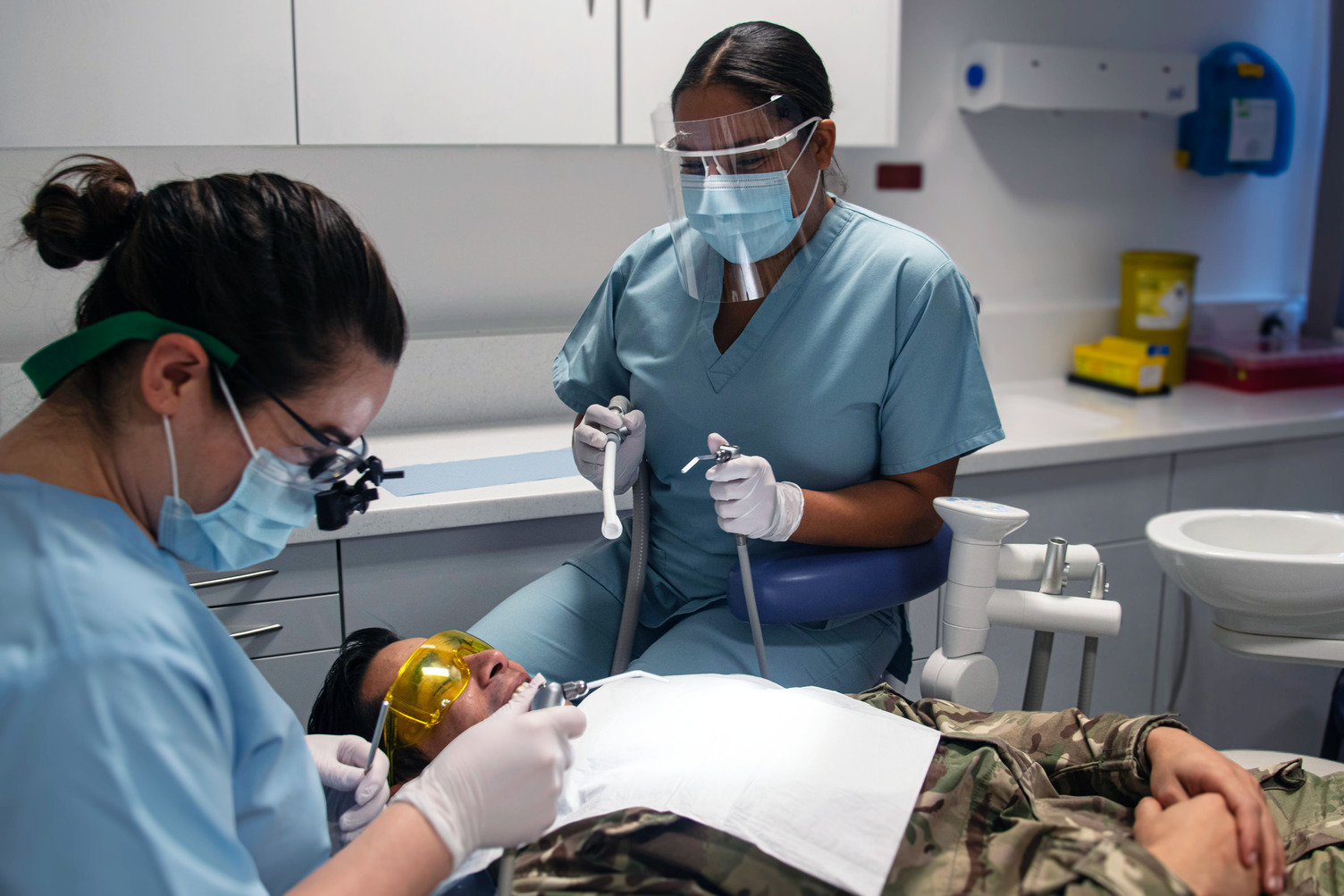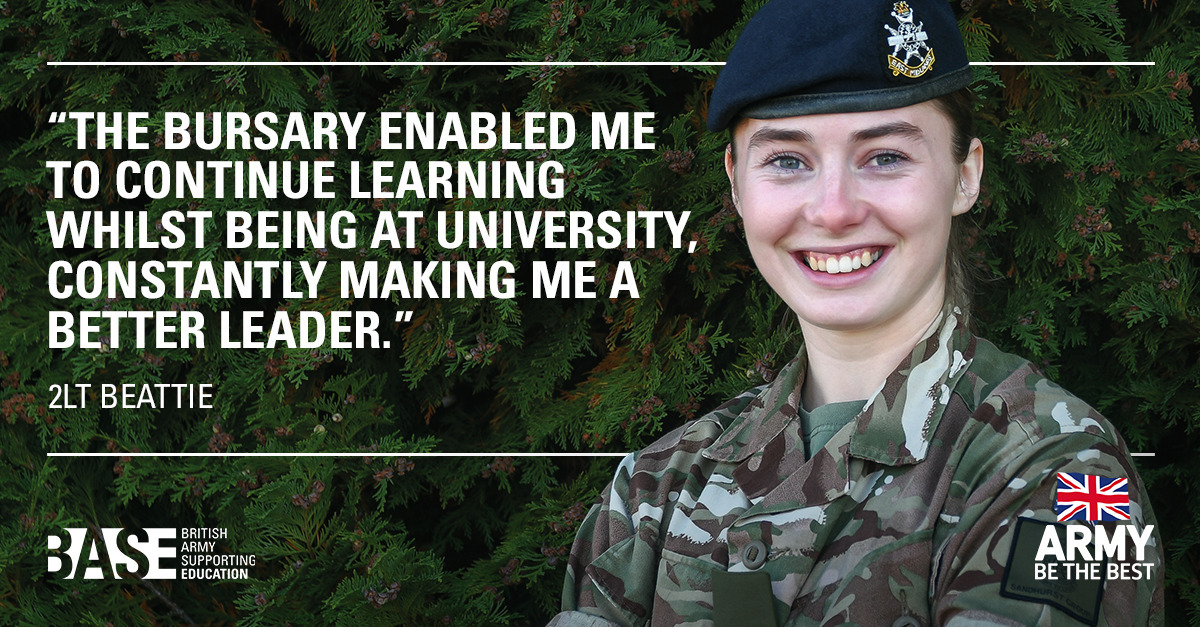Employers and Universities: Work with us?

The British Army
Visit employer websiteThe British Army is the land branch of the British Armed Forces.
About
The British Army is the land branch of the British Armed Forces. It supports peacekeeping and humanitarian operations, trains soldiers and officers, and works to maintain global and national security. Soldiers can also learn a trade, with over 70 roles available across seven career streams: Combat, Logistics & Support, Engineering, Medical, Intelligence & Communications, Music, and HR & Finance. After initial and trade training, daily life varies greatly, making a career in the Army exciting!
What's in it for you?
Adventurous Training pushes you beyond your comfort zone, enhancing leadership, resilience, decision-making, teamwork, physical fitness, and courage.
The opportunities for adventure are vast. You might find yourself wreck diving off New Zealand's coast, white-water kayaking on Norway's Sjoa River, or skiing in Greenland.
You'll dedicate part of your workday to fitness, typically in group sessions led by Army Physical Training Instructors (PTIs). You'll also have access to gyms and fitness facilities for personal use, along with hundreds of sports teams you can join.
Ask anyone in the Army about their most memorable experiences, and they'll likely mention the incredible places they've visited. The Army offers numerous travel opportunities through operations, exercises, and Adventure Training.
Entry Options:
You can join the British Army as a Regular Soldier in two ways, depending on your age:
- Junior Soldier: If you're 16 to 17.5 years old, you'll attend the Army Foundation College in Harrogate.
- Regular Soldier: If you're 18 or older, you'll start with 13 weeks of Initial Training at a training establishment based on your chosen job.
- Army Officer Scholarship: The Army Officer Scholarship Scheme provides financial support of £3,000 to up to 100 A-Level, Scottish Higher, or equivalent students annually, guaranteeing a place at the Royal Military Academy Sandhurst, with officer training that includes business skills and counts towards a BSc in Leadership and Strategic Studies with Henley Business School and the University of Reading.
- Regular Officer (Non Graduate): Most officer roles don't require a degree, but you can enroll in a funded BSc in Leadership and Strategic Studies at the University of Reading through Henley Business School, with 42 weeks at Sandhurst counting towards a third of the degree, which can be completed in three to six years.
Work Experience
Students interested in exploring career options within the Army can participate in a four-day residential work experience program aimed at enhancing skills such as teamwork, leadership, confidence, and resilience.
To book Work Experience or an Elite Skills Academy session, please email: rg-nrcoutreachadmin@mod.gov.uk or phone 0345 600 8080 and ask for ‘Outreach’.
Apprenticeships
GET SKILLS. GET QUALIFIED. GET CONFIDENCE.
The Army has been awarded 1st place in the Top 100 Apprenticeship Employers for the 4th year in a row.
- 90% of soldiers enrol on
- 40% of different schemes offered
- 5 levels of apprenticeships available
- Same as 5 GCSE passes when completing Level 2
The Army has a diverse range of apprenticeships. The type of apprenticeship you complete will depend on your role in the Army, and with over 40 different apprenticeships available here are just some of the ones you could be doing:
ENGINEERING
- Engineering Technician
- Heating & Plumbing
- Fabrication & Welding
- Aircraft Maintenance
INTELLIGENCE & DIGITAL
- Intelligence Analyst
- Network Cable Installer
- Network Engineer
- Data Analyst
- Maintenance and Operations Engineering Technician
HR
- Business Administrator
PROTECTIVE SERVICES
- Non-Home Office Police Officer (note that this is not the same as the Level 6 Police Constable Integrated Degree)
LOGISTICS & SUPPLY
- Production Chef
- Large Goods Vehicle (LGV) Driver C + E
- Port Operative
- Aviation Customer Services Operative
- Ordnance, Munitions and Explosives Technician
- Supply Chain Warehouse Operative
MEDICAL
- Senior Healthcare Support Worker
- Animal Care & Welfare Assistant
- Veterinary Nurse
COMBAT
- HM Forces Service Person (Protective Services)
- Equine Groom
- Aviation Ground Handler
Search Army Apprenticeships
School Leaver
Army Foundation College, Harrogate
At the Army Foundation College (AFC), Harrogate we get 16 and 17 year olds ready for a career in the British Army. We can help you get the military skills, fitness and education that you need for a great start in whichever part of the Army that suits you - while you earn a good wage and make friends for life.
There are two courses, a long and short course. Which one you join depends on the job you're hoping to do in the Army. If you're on the short course you'll have three weeks off, mid-term, while those doing the long course will have eight weeks off.
Short course (23 weeks)
Army Air Corps, Adjutant General's Corps (SPS), Royal Signals, Army Medical Corps, Royal Engineers, Royal Logistic Corps, Royal Electrical & Mechanical Engineers, Corps of Army Music
Long course (48 weeks)
Infantry, Royal Armoured Corps, Royal Artillery, Household Cavalry, Royal Logistic Corps.
Find Out More About AFC Harrogate
Diversity and Inclusion
The British Army represents the diversity of modern Britain. It welcomes British citizens from all backgrounds – every gender and gender identity, race, ethnicity, religious belief, sexual orientation and social background. The Army values diversity and is committed to inclusion and has a strict code of conduct to make sure that everyone is treated fairly.
As an Army Officer, you’ll be expected to embody that code and lead by example. Pay and promotion opportunities within the Army are identical for people of all genders, and maternity and paternity leave is available to all parents. The Army welcomes Transgender, Lesbian, Gay and Bisexual soldiers who all serve throughout the Army playing their part in the country’s security. People who have completed gender transition are treated as an individual of their acquired gender.
The Army is very supportive of those who wish to observe the customs of their faith, although operational necessity may sometimes limit this. Observances of all major religions are accommodated and soldiers may wear beards and adopt hairstyles and dress in accordance with their faith. Dietary provisions are made for all major religions at all times. Spiritual advisors serve throughout the Army, offering help and guidance to all soldiers, whether religious or not. These include Chaplains of the Buddhist, Hindu, Muslim, Jewish, Christian and Sikh faiths.
The British Army is an equal opportunities employer and offers full and fulfilling careers based purely on talent and ability. Professional networks exist throughout the Army to connect like-minded people who have an interest in aspects of diversity. The British Army wants the best people that British society has to offer. Diversity is integral to this aspiration.

Sponsorship
Defence Stem Undergraduate Sponsorship (DSUS) - Up to £42,750
The Defence STEM Undergraduate Sponsorship (DSUS) Scheme supports STEM undergraduates aiming to become Engineers or Technical Officers in the Army. Open to officer candidates with a conditional offer for an Army-endorsed STEM degree, applicants must pass the Army Officer Selection Board and can join the University Officer Training Corps.
Successful applicants receive up to £42,750, including an annual bursary of £5,000 and up to £9,250 in tuition fees per year for three years. After university, you'll attend the Royal Military Academy Sandhurst and then serve in the Royal Engineers, Royal Signals, Royal Electrical and Mechanical Engineers, Royal Logistic Corps, Intelligence Corps, Royal Artillery, Army Air Corps, or the Adjuant General's Corps.
Internships
You'll receive world-class leadership training at the Royal Military Academy Sandhurst, followed by role-specific training. After 2 months at Sandhurst, you'll spend 10 months with a regular Army unit, learning to lead a team of up to 30 soldiers in various career streams like Engineering, IT, Logistics, Medical, HR, and Combat. You can take an internship before, during, or after university, getting paid throughout and participating in sports and training exercises, but not deploying on operations. After the internship, there's no commitment, but you can fast-track into an Army career if you choose.
To qualify, you need a firm place for a first degree at a university or have graduated within the last 2 years, be aged 17 years 10 months to 28 years by mid-September of the year you start at Sandhurst, have 72 UCAS points and 35 ALIS points (including a C/4 or above in English, maths, and a science or foreign language), and pass a basic fitness test.
Search Army Internships

Graduate
Professionaly Qualified Officers
Some people have their heart set on going to university, and some of our officer roles do require specialist degrees before you can join – including qualified medical or legal positions. If you want to join the Army after university, we can support you with a number of bursary options, ranging from £6,000 to £75,000, to support you through your education.
Become a Specialist in the Army



